Buy Farm in Portugal: Your Essential Guide to Ownership
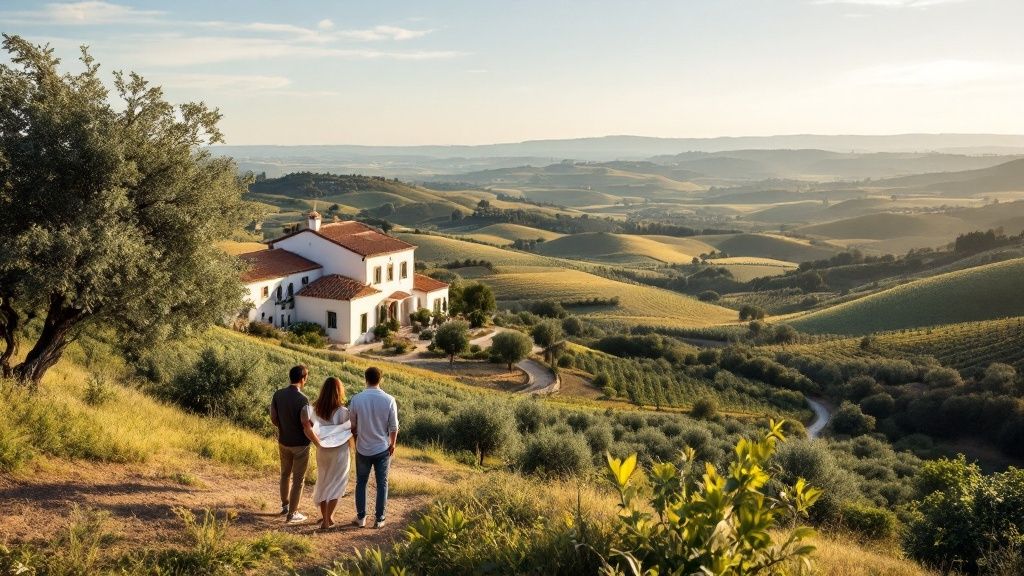
Buying a farm in Portugal is a very achievable dream, even for international buyers.The country places no restrictions on foreigners purchasing agricultural land, which opens the door wide for anyone looking to cultivate a new life here.
But it’s important to understand this isn't just a simple real estate transaction. You’re stepping into a world steeped in agricultural tradition, often dealing with family-owned properties that hold generations of history.
What It Really Means to Buy a Portuguese Farm
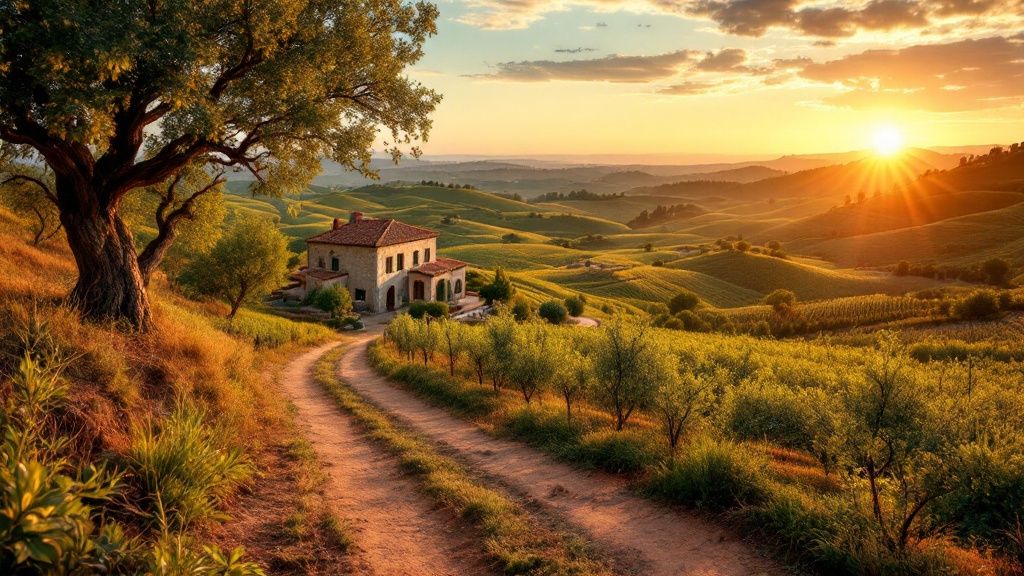
Before you even start scrolling through property listings, take a moment. Buying a farm here means navigating a landscape shaped by culture, geography, and centuries of tradition—a world away from a standardized suburban home purchase.
This is about more than just acreage and a house. It's about seeing the land’s potential and understanding its role within the local community. The very definition of a "farm" changes dramatically as you travel across the country.
Different Types of Rural Properties
As you begin your search, you'll come across a vocabulary that's unique to rural Portugal. You won't just see listings for "farms." Instead, you'll find specific terms that tell a story about a property's history, size, and purpose.
- Quinta: This is the term you'll see most often. It generally refers to a traditional farmhouse or country estate with land attached. A quinta can be anything from a small, charming property with an old fruit orchard to a much larger commercial operation with established vineyards. They are almost always family-owned and carry a deep sense of heritage.
- Herdade: Head south to the vast, rolling plains of the Alentejo, and you’ll find the herdade. These are large agricultural estates, often massive properties spanning thousands of hectares. Historically, they were the centers of production for cork, cattle, or grain.
- Monte: Also common in the Alentejo, a monte technically refers to a slightly elevated piece of land, but it's used to describe the collection of farm buildings on it—the homestead within a larger estate.
Getting a feel for these distinctions is your first real step. If you're dreaming of a small-scale organic vegetable garden, you’re probably looking for a quinta in the north. If your ambitions are geared toward large-scale olive oil production, your search will lead you straight to a herdade in the south.
You can get a sense of the variety by exploring our listings of Portuguese country houses.
The Cultural and Agricultural Landscape
Portugal's agricultural heart is strong, and it beats to the rhythm of family. The country has roughly 259,000 active farms spread across 3.6 million hectares of land. Here's the key statistic: it's estimated that up to 80% of these are family-owned.
This reality fundamentally shapes the market. You're often buying a piece of someone's personal history, not just a line item in an investment portfolio.
You’ll find that a property might have been in the same family for generations. This can make the sale an emotional process for the sellers, but it's a huge plus for you. It often means the property comes with a rich, well-documented history and priceless features like mature olive groves or decades-old vineyards.
The top agricultural products in Portugal are wine, olive oil, fruits, and cereals. Your own goals need to line up with the right region. The Douro Valley is world-famous for its terraced vineyards. The Alentejo is the undisputed king of cork oaks and olive groves. And the sun-drenched Algarve is perfect for citrus and avocado orchards.
Matching your vision to the right microclimate and region isn't just a good idea—it's the foundation of a successful purchase.
Building Your Professional Team in Portugal
Trying to buy a farm in Portugal without the right local experts is like navigating the Douro Valley without a map. You might get there eventually, but you're bound to hit a few dead ends and make some costly mistakes along the way. Putting together your professional team isn't just a box to tick; it's the most critical investment you'll make for a smooth, secure purchase.
But before you can hire anyone, you need to exist legally in Portugal. That all starts with one key document that unlocks everything else.
First Things First: Your NIF and a Bank Account
The very first piece of the puzzle is getting your NIF (Número de Identificação Fiscal). Think of it as your Portuguese tax identification number. You can't open a bank account, sign a contract, or buy a property without one. Thankfully, getting a NIF is pretty straightforward and can be handled by a lawyer or a specialized service, often without you even having to be in the country.
Once you have your NIF, your next move should be opening a Portuguese bank account. While you don't technically need it until the final stages, getting it done early makes life so much easier. It simplifies transferring funds for deposits and fees and, just as importantly, signals to sellers that you're a serious, committed buyer. Most major banks in Portugal are well-versed in handling foreign clients and have English-speaking staff.
Finding the Right Real Estate Agent
Let's be clear: not all real estate agents are the same, especially when you're looking for a farm. The star agent selling slick Lisbon apartments probably isn't the specialist you need for a rural quinta. You need someone who lives and breathes agricultural properties.
A good agent should be able to talk knowledgeably about:
- Water Rights: They should immediately ask about furos (boreholes), poços (wells), and dam access and know precisely how to verify their legal status.
- Zoning Laws: An experienced rural agent will be familiar with the local PDM (Plano Diretor Municipal) and can tell you what you can (and can't) build or farm on a particular piece of land.
- Land Designations: They need to understand the crucial difference between RAN (Reserva Agrícola Nacional) and REN (Reserva Ecológica Nacional) land and explain how that impacts what you want to do.
A great agent for rural properties will have deep roots in the local community. They often hear about farms for sale long before they ever appear on a website. When you're talking to potential agents, ask them for specific examples of recent farm sales they've managed. If you can, ask to speak with one of their past clients.
Pro Tip: Don't hesitate to interview several agents. This is a huge partnership. Ask them directly about their experience with foreign buyers and agricultural land. It's the best way to get a feel for their expertise and see if their communication style works for you.
Selecting Your Legal Counsel
Your lawyer is your single most important ally in this entire process. Their job isn't just to shuffle papers; they are your primary defense against legal and financial pitfalls. It is absolutely crucial that you hire a lawyer who is independent—not one recommended by the seller or their agent. This avoids any potential conflict of interest.
Unless you're fluent in Portuguese, a bilingual lawyer is non-negotiable. They are responsible for the deep dive of due diligence. This means verifying the property's legal title, checking for any hidden debts or liens, and confirming that every structure on the land is legally registered.
For instance, a common scenario is falling in love with a property that has a charming old stone ruin, only to find out it doesn't exist on any official paperwork. Your lawyer is the one who will spot this red flag and advise you on the risks and potential pathways to legalization, saving you a world of trouble later.
Finally, you’ll work with a Notary (Notário). A notary is a neutral, state-appointed official who oversees and formalizes the final deed, known as the Escritura. While your lawyer represents your interests, the notary ensures the transaction is legally sound for everyone involved. Your lawyer will handle all the coordination with the notary to make sure the final signing is seamless.
Finding and Vetting Your Ideal Property
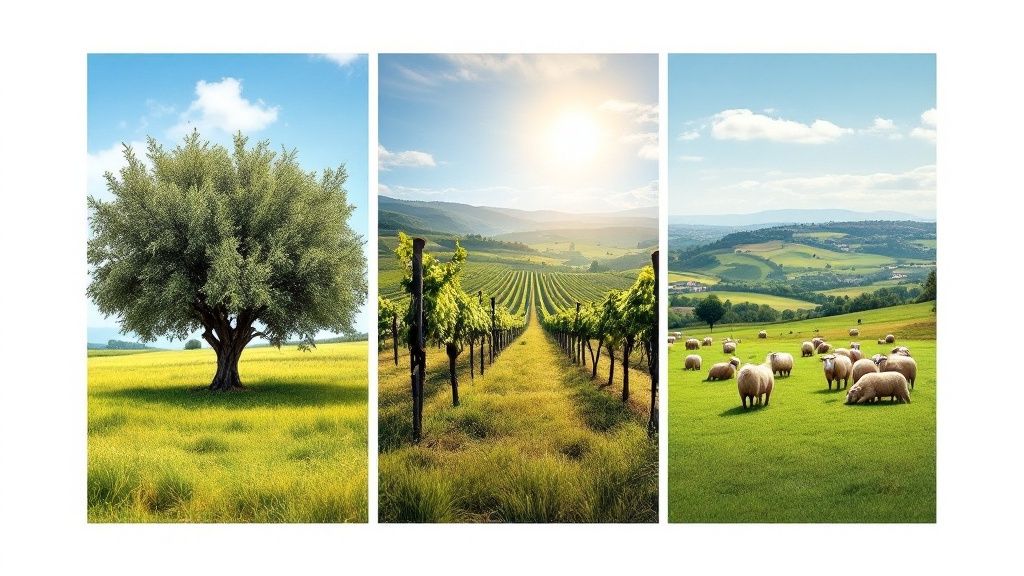
Let's be realistic: the perfect Portuguese farm probably isn't going to pop up on the first page of a big property website. The real gems—the ones with genuine character and potential—often surface through local connections or specialist agents who know the rural market inside and out. Your search needs to be a savvy mix of online browsing and, more importantly, old-fashioned, on-the-ground detective work.
Once you find a place that speaks to you, the real work begins. It’s easy to get swept up in the romance of a crumbling stone quinta or a sprawling olive grove, but this is the moment to pump the brakes and shift into investigation mode. This due diligence phase is what separates a dream from a disaster. It’s where you protect your investment and prevent future heartbreak.
Starting Your Search the Right Way
Major international property portals are fine for getting a general feel for the market, but they're just the tip of the iceberg. To uncover the truly special opportunities, you have to dig deeper. A specialized real estate agent who lives and breathes rural properties will be your single greatest asset, often giving you access to off-market listings you’d never find otherwise.
Don't underestimate the power of simply being there. Spend real time in the region you're targeting. Sit in the local cafes, chat with people, and just listen. You’d be surprised what you can learn and who you might meet. This boots-on-the-ground approach is invaluable when you want to buy a farm in Portugal that feels like a genuine part of the community, not just a property.
Your Essential Due Diligence Checklist
When a property makes it to your shortlist, it's time to let your lawyer take the lead. They will conduct a meticulous review of all the legal paperwork, but you need to be an active participant. Arm yourself with the right questions and understand exactly what they’re looking for.
Here are the non-negotiables you must investigate:
- Property Registration and Boundaries: This is the absolute bedrock of your purchase. Your lawyer will pull the property's complete legal history to confirm ownership and make sure the registered boundaries match what you see on the ground.
- Building Legality: Portugal is full of properties with unpermitted structures—a shed here, an extension there, maybe even a swimming pool built without the proper sign-off. Your lawyer must check the habitation license (Licença de Utilização) for every single structure to ensure it's 100% legal. An illegal build can become a massive headache, leading to fines or even demolition orders down the line.
- Water Rights: For any farm, this is arguably the most critical element. You have to get official, documented proof that any water source—be it a borehole (furo), well (poço), or spring (nascente)—is legally registered and that its rights belong to the property. A seller's verbal promise means nothing. In a dry region like the Alentejo, a farm without guaranteed, legal water is practically worthless.
- Zoning and Land Use Restrictions: You need to know precisely what you can and cannot do with the land. Your lawyer will scrutinize the local municipal plan, the PDM (Plano Diretor Municipal). This document dictates all zoning laws and will tell you if your plans to build a new guesthouse, expand the main house, or run a tourism business are even possible.
A common, heartbreaking story: a buyer purchases a huge plot of land, dreaming of building guest cottages, only to find out it’s designated as Reserva Agrícola Nacional (RAN), where new construction is almost impossible. Checking the PDM upfront avoids this kind of devastating surprise.
Before you get too far, it's crucial to understand the key documents your lawyer will be reviewing. Getting familiar with these terms will help you follow the due diligence process and ask smarter questions.
Essential Portuguese Property Documents Explained
Here's a quick reference for the main legal documents you'll encounter. Think of this as your cheat sheet for understanding the property's legal DNA.
| Document Name | What It Is | Why It's Critical |
|---|---|---|
| Caderneta Predial | The property's tax registration document from the Finanças (tax office). | It details the property's fiscal information, including its official size, description, and tax value. This must match the land registry. |
| Certidão de Teor | The official land registry certificate from the Conservatória do Registo Predial. | This is the ultimate proof of ownership. It confirms who the legal owner is and lists any debts, mortgages, or liens against the property. |
| Licença de Utilização | The habitation or usage license issued by the local Câmara (municipal council). | It confirms that a building was constructed legally and is fit for its intended purpose (e.g., habitation, commerce, storage). Essential for all structures. |
| Plano Diretor Municipal (PDM) | The local municipal zoning plan. | This master plan dictates land use, outlining what can be built, where, and for what purpose. It's the key to understanding your property's future potential. |
Having these documents in order isn't just a formality; it's the foundation of a secure purchase. Your lawyer's job is to ensure every detail across these papers aligns perfectly.
Spotting Red Flags in the Real World
Knowing the theory is one thing, but spotting trouble in practice is a skill you develop. During property viewings and legal checks, keep your eyes and ears open for signs of potential issues.
For instance, if a seller gets vague about property boundaries or mentions a casual "understanding" with a neighbor about an access road, that's a huge red flag. Unresolved inheritance claims are another classic problem with old family farms. Your lawyer absolutely must confirm that all legal heirs have signed off on the sale to prevent messy ownership battles later.
I once worked with a British couple who found a stunning quinta with a beautifully renovated barn. During due diligence, their lawyer discovered the renovation was never permitted. The seller had just done the work himself years ago. This forced the buyers into a tough choice: walk away, or negotiate a massive price reduction to cover the expensive and lengthy process of legalizing the building.
This is exactly why a thorough investigation isn't just about ticking boxes. It’s about protecting your entire investment when you buy a farm in Portugal. Your professional team is there to make sure the property you fall in love with is also a sound, secure, and legal asset.
Financing Your Purchase and Budgeting for Costs
Alright, let's talk money. Figuring out the financial side of buying a farm in Portugal is arguably the most critical step. The sticker price is just the starting point; a realistic budget needs to account for everything else that comes with the territory. Getting this right from the beginning will save you a world of headaches later on.
First things first: securing a loan as a foreigner is absolutely doable. Portuguese banks are quite accustomed to working with international buyers. However, they're often a bit more cautious when it comes to rural properties versus a slick city-center apartment. Lenders need to see that you're a good bet—that means showing a solid financial track record, proof of steady income, and a clear vision for what you plan to do with the farm.
Getting a Mortgage from a Portuguese Bank
When you walk into a bank for a mortgage, think of it as presenting a business case. Your job is to make them feel confident in lending to you. For non-residents, most banks will finance up to 70-80% of the property's valuation price. This means you need to be ready with a down payment of at least 20-30%.
To get the ball rolling, you’ll need to have your documents in order. They’ll typically ask for:
- Proof of Income: Your most recent tax returns, pay stubs, or employment contracts will do the trick.
- Bank Statements: Usually from the last three to six months to show a stable financial situation.
- Credit Report: You'll need to provide one from your home country.
- NIF and a Portuguese Bank Account: These are absolute must-haves before you even think about applying.
Here's a crucial point many buyers miss: the bank will conduct its own valuation of the farm, and their loan offer is based on their number, not the price you agreed to with the seller. If the bank’s valuation comes in lower than the purchase price—which can happen—you'll have to cover that shortfall yourself.
The True Cost: Budgeting Beyond the Sale Price
The price you negotiate for the farm is only one piece of the financial puzzle. A whole host of taxes and fees pop up during the transfer of ownership, and they add up fast. A good rule of thumb is to set aside an extra 8-10% of the purchase price just to cover these closing costs.
Let's break down exactly where that money goes.
Key Transaction Costs You Can't Ignore
- IMT (Property Transfer Tax): This is the big one. Officially called Imposto Municipal sobre as Transmissões Onerosas de Imóveis, this is your single largest closing cost. It’s calculated on a sliding scale, but for purely rural land (prédio rústico), it’s usually a flat 5%. If the property includes a house (prédio urbano), the rate can climb as high as 7.5%.
- Imposto do Selo (Stamp Duty): Think of this as a tax on the paperwork itself. It’s a fixed rate of 0.8% of the property’s value. If you’re getting a mortgage, you'll pay an additional stamp duty of 0.6% on the loan amount.
- Notary and Registration Fees: These fees pay for the official preparation of the final deed (Escritura) and for registering the property in your name. You can expect this to cost somewhere between €750 and €1,500.
- Legal Fees: Don't skimp here. A good lawyer is worth their weight in gold. Their fees usually run 1-2% of the purchase price, plus VAT (IVA at 23%). It's an investment in peace of mind.
Let’s put that into perspective. For a farm you’re buying at €400,000, your closing costs could easily hit €32,000 or more. Factoring this into your budget from day one is essential to avoid any last-minute financial panic.
The agricultural sector is deeply woven into Portugal's identity. In 2022, a staggering 42.79% of the country's land was dedicated to agriculture, a statistic that underscores just how much farmland is out there. You can dig deeper into Portugal's agricultural land trends to get a better sense of the landscape.
Seeing real-world examples can also help you picture what's possible. Properties like this expansive 5-bedroom home with a pool in scenic Alte show how you can blend a comfortable home life with the dream of rural living. Careful financial planning is what makes turning that dream into a reality possible.
From a Promissory Contract to Final Ownership
You've done the hard work—the searching, the vetting, the financial planning—and you've finally found the perfect Portuguese farm. Now comes the final stretch: navigating the legal steps that take you from an accepted offer to holding the keys. Don't worry, this part of the process is very structured in Portugal, designed to protect both you and the seller.
The entire transaction really boils down to two key legal events: signing the Promissory Contract and then the final deed, known as the Escritura. Getting a handle on how each one works will give you the confidence to see this through to the finish line.
Securing the Deal with the Promissory Contract
Once your offer is accepted, the first big legal hurdle is signing the CPCV (Contrato de Promessa de Compra e Venda), which is the Promissory Contract of Purchase and Sale. Think of this as much more than a simple handshake agreement; it's a legally binding contract that locks in both parties and outlines every single detail of the sale.
Your lawyer's job here is to either draft or meticulously review the CPCV to make sure it covers all the critical information. This typically includes:
- A full legal description of the property.
- The final, agreed-upon purchase price.
- The exact deposit amount to be paid.
- A firm date for signing the final deed (Escritura).
- Any special conditions, like whether that tractor is included or if a leaky roof needs fixing before closing.
When you sign the CPCV, you'll also hand over the deposit, usually between 10% and 20% of the purchase price. This payment shows you're serious and officially takes the property off the market.
Portuguese law provides some serious protections at this stage. If the seller gets cold feet and backs out, they are legally required to pay you back double your deposit. On the flip side, if you decide to pull out, you'll forfeit the entire deposit.
This contract is your safety net. It locks in the terms and has significant financial penalties for anyone who tries to back out without a valid legal reason. It’s what ensures the sale actually happens as planned.
Securing a deal with a solid CPCV is more important than ever. The availability of good agricultural land is becoming increasingly competitive. For decades, Portugal has seen its total agricultural area shrink, with data showing a consistent annual decrease of around 3.5%. This trend means that when you find a farm you love, locking it down is crucial. You can find more details on this in data about Portugal's shrinking agricultural land from ReportLinker.
The Final Step: The Escritura
The day you sign the Escritura is the moment you officially become the owner of your Portuguese farm. This final signing ceremony happens at the office of a Notário (Notary), who is a neutral, state-appointed legal professional tasked with verifying the transaction's legality.
Before you even get to this meeting, your lawyer will have been busy making sure all the necessary taxes, like the IMT (Property Transfer Tax) and Stamp Duty, are paid. You can't sign the final deed without proof of these payments, so it’s a non-negotiable step.
A few key people must be at the signing:
- You (the buyer), or your legal representative if you've granted them Power of Attorney.
- The seller(s), or their representative.
- The Notary, who will read the entire deed aloud in Portuguese.
If you aren't fluent in Portuguese, it’s completely normal (and highly recommended) to have your lawyer or a translator present. They’ll make sure you understand every word before you put pen to paper. Once the deed is read, understood, and signed by everyone, the final payment is transferred, and the keys are finally yours.
This image breaks down the key financial stages of buying a farm in Portugal, from the initial purchase to ongoing upkeep.
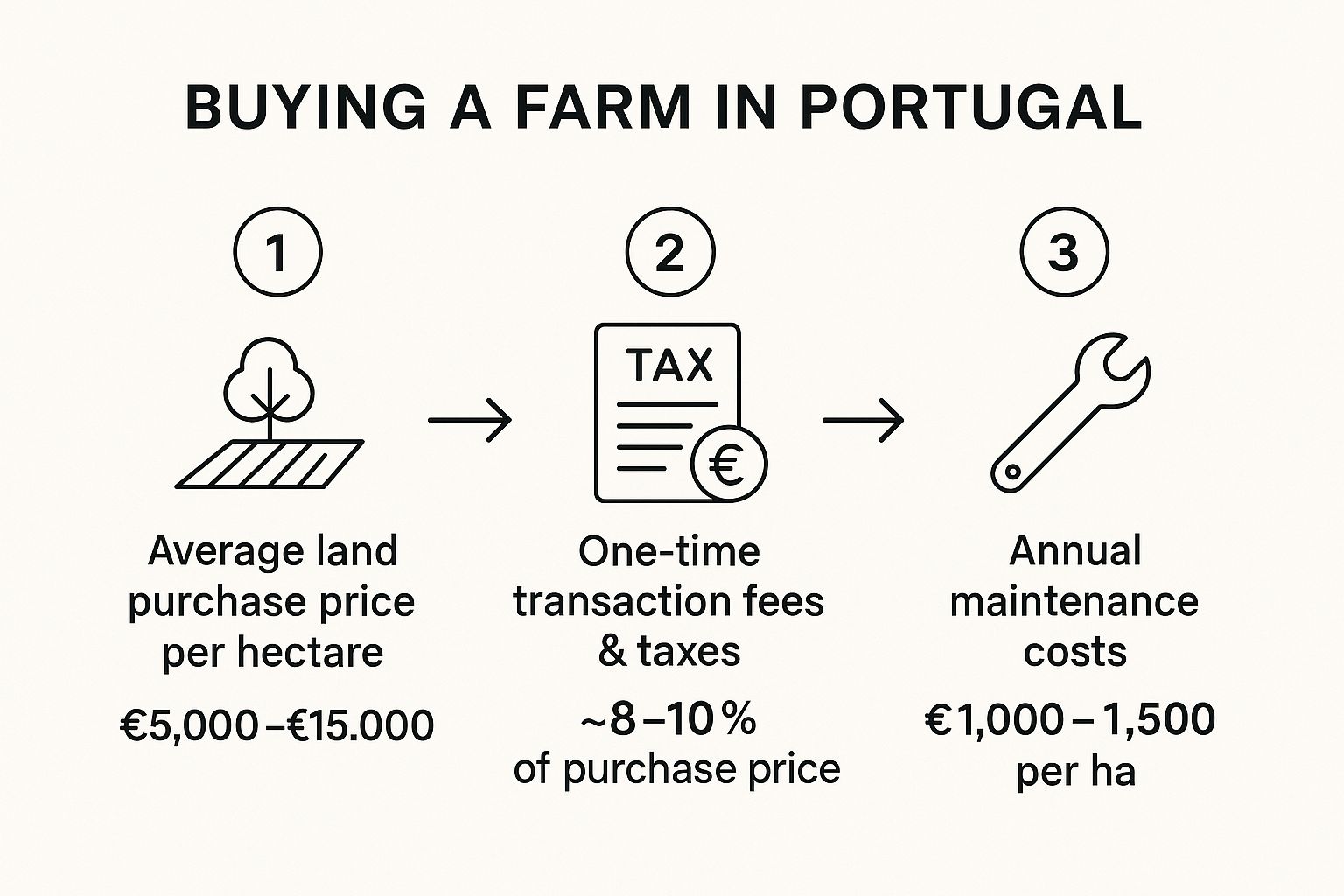
As you can see, after the main investment in the land, it's wise to budget an extra 8-10% for one-time transaction costs and also plan for annual maintenance expenses.
With the signing done, there's just one last piece of admin. Your lawyer will take the signed Escritura to the Land Registry (Conservatória do Registo Predial) to officially register the property in your name. This updates the public record and solidifies your legal ownership. It's the final, satisfying step that turns a property like this contemporary 4-bedroom farmhouse with a pool into your own.
Congratulations, you are now a farm owner in Portugal
Common Questions About Buying a Portuguese Farm
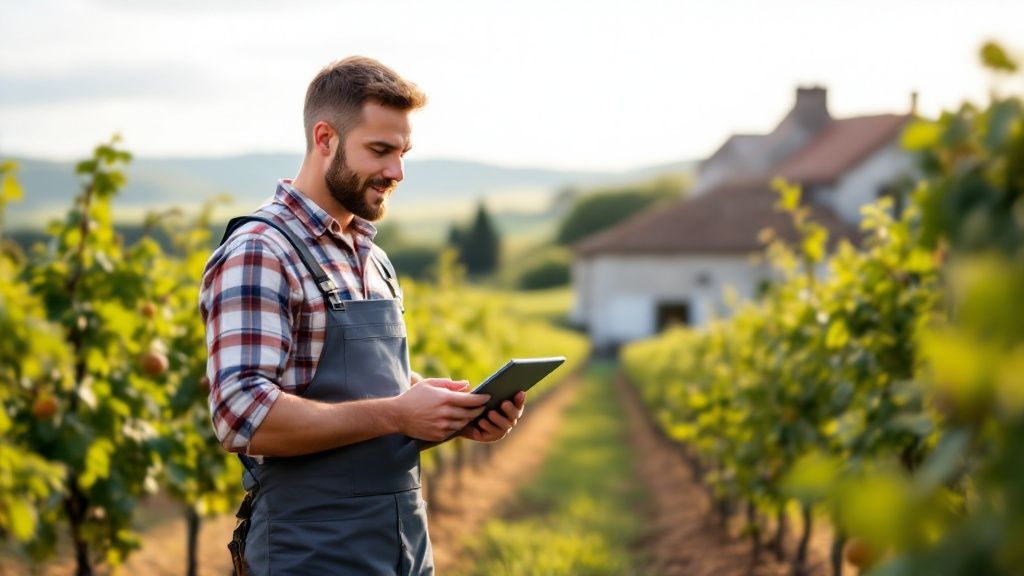
Once you get into the nitty-gritty of buying a farm in Portugal, the practical questions start to pop up. These are the details that don't always fit into a neat, step-by-step guide but are absolutely crucial for your planning and peace of mind.
Let's dive into some of the most common things international buyers ask, so you can get clear, direct answers and navigate the finer points of your purchase with confidence.
Are There Restrictions on Foreigners Buying Agricultural Land?
This is usually the first question on everyone's mind, and the answer is refreshingly straightforward: No, there are no specific laws stopping non-EU citizens from buying agricultural land in Portugal.
The country is remarkably open to foreign investment in its rural areas. The legal process you'll go through is exactly the same as it is for a Portuguese citizen. Your nationality simply isn't a factor; the entire focus is on making sure your paperwork is in order.
As long as you get a Portuguese NIF (your tax identification number) and follow the correct procedures with your legal team, you have the same buying rights as any local.
Can I Get a Residence Permit if I Buy a Farm?
This is where things get a bit more nuanced. While simply buying a property no longer gets you the famous Golden Visa, owning and actively operating a farm can seriously boost an application for other types of residency permits.
Think of your farm as the foundation for a visa application, such as:
- The D2 Visa (Entrepreneur Visa): This is perfect for anyone looking to start a business in Portugal. If you can put together a solid, viable business plan for your farm—whether it's for wine production, an agritourism project, or growing organic produce—this is an excellent path to residency.
- The D7 Visa (Passive Income Visa): Do you have a reliable passive income from outside Portugal, like pensions or rental income? If it meets the minimum threshold, your farm serves as your stable, required address in the country, making your application much stronger.
The key takeaway here is to speak with an experienced immigration lawyer. They can look at your specific plans and financial situation to figure out the best and most successful route to getting your residency.
What Ongoing Taxes and Costs Should I Expect?
Your financial planning can't stop the day you get the keys. Owning property in Portugal means you have annual responsibilities that need to be in your budget from day one.
The main ongoing cost is the IMI (Imposto Municipal sobre Imóveis), which is the annual property tax. The rate is set by your local municipality and usually falls somewhere between 0.3% and 0.45% of the property's registered tax value (Valor Patrimonial Tributário), which is almost always lower than its market price.
Beyond the IMI, make sure you also account for:
- Routine maintenance and property insurance.
- Utility bills (water, electricity, internet).
- Income tax, if and when your farm starts generating revenue.
- Social security contributions if you end up hiring staff.
How Important Are Water Rights When Buying a Farm?
In a word: critical. I'd argue that water rights are the single most important technical detail to check, especially in the sun-drenched southern regions like the Alentejo. A gorgeous property without secure, legal water access is a massive liability.
Your lawyer's most vital job during due diligence is to verify that every water source on the property is legally registered and its rights belong to the land you're buying. This covers everything:
- Boreholes (furos)
- Wells (poços)
- Springs (nascentes)
- Rights to access dams or rivers
Never, ever take a seller’s verbal promise on this. You must insist on seeing the official paperwork proving the water sources are legal and part of the sale. Getting this one piece of due diligence right can make or break the entire future of your farm.
Ready to find your perfect rural escape in Europe? At Residaro, we specialize in connecting international buyers with exceptional properties, from charming quintas in Portugal to stunning villas across the continent. Explore our curated listings and start your journey today at https://residaro.com.